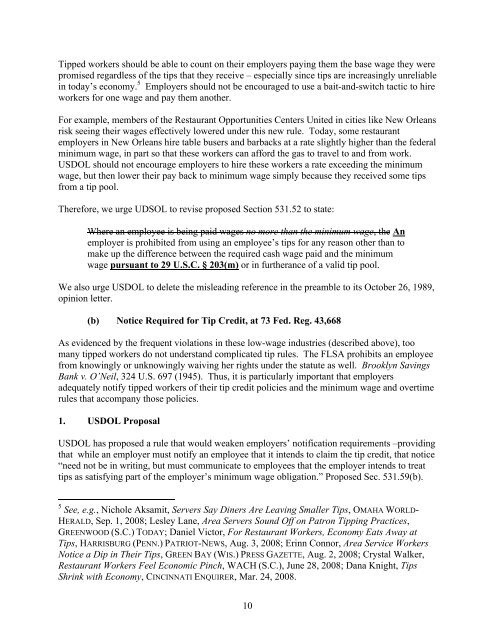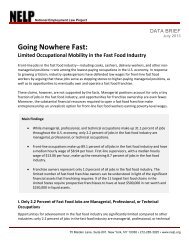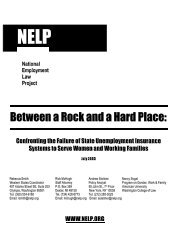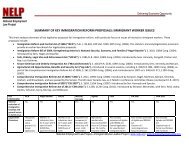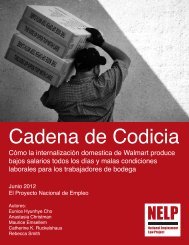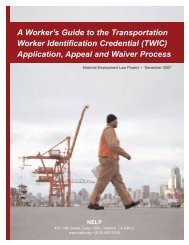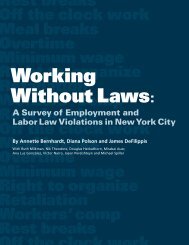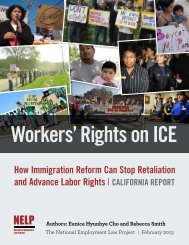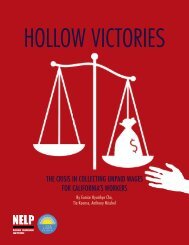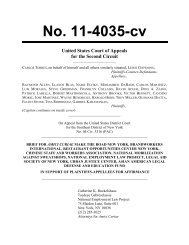National Employment Law Project
National Employment Law Project
National Employment Law Project
You also want an ePaper? Increase the reach of your titles
YUMPU automatically turns print PDFs into web optimized ePapers that Google loves.
Tipped workers should be able to count on their employers paying them the base wage they were<br />
promised regardless of the tips that they receive – especially since tips are increasingly unreliable<br />
in today’s economy. 5 Employers should not be encouraged to use a bait-and-switch tactic to hire<br />
workers for one wage and pay them another.<br />
For example, members of the Restaurant Opportunities Centers United in cities like New Orleans<br />
risk seeing their wages effectively lowered under this new rule. Today, some restaurant<br />
employers in New Orleans hire table busers and barbacks at a rate slightly higher than the federal<br />
minimum wage, in part so that these workers can afford the gas to travel to and from work.<br />
USDOL should not encourage employers to hire these workers a rate exceeding the minimum<br />
wage, but then lower their pay back to minimum wage simply because they received some tips<br />
from a tip pool.<br />
Therefore, we urge UDSOL to revise proposed Section 531.52 to state:<br />
Where an employee is being paid wages no more than the minimum wage, the An<br />
employer is prohibited from using an employee’s tips for any reason other than to<br />
make up the difference between the required cash wage paid and the minimum<br />
wage pursuant to 29 U.S.C. § 203(m) or in furtherance of a valid tip pool.<br />
We also urge USDOL to delete the misleading reference in the preamble to its October 26, 1989,<br />
opinion letter.<br />
(b) Notice Required for Tip Credit, at 73 Fed. Reg. 43,668<br />
As evidenced by the frequent violations in these low-wage industries (described above), too<br />
many tipped workers do not understand complicated tip rules. The FLSA prohibits an employee<br />
from knowingly or unknowingly waiving her rights under the statute as well. Brooklyn Savings<br />
Bank v. O’Neil, 324 U.S. 697 (1945). Thus, it is particularly important that employers<br />
adequately notify tipped workers of their tip credit policies and the minimum wage and overtime<br />
rules that accompany those policies.<br />
1. USDOL Proposal<br />
USDOL has proposed a rule that would weaken employers’ notification requirements –providing<br />
that while an employer must notify an employee that it intends to claim the tip credit, that notice<br />
“need not be in writing, but must communicate to employees that the employer intends to treat<br />
tips as satisfying part of the employer’s minimum wage obligation.” Proposed Sec. 531.59(b).<br />
5 See, e.g., Nichole Aksamit, Servers Say Diners Are Leaving Smaller Tips, OMAHA WORLD-<br />
HERALD, Sep. 1, 2008; Lesley Lane, Area Servers Sound Off on Patron Tipping Practices,<br />
GREENWOOD (S.C.) TODAY; Daniel Victor, For Restaurant Workers, Economy Eats Away at<br />
Tips, HARRISBURG (PENN.) PATRIOT-NEWS, Aug. 3, 2008; Erinn Connor, Area Service Workers<br />
Notice a Dip in Their Tips, GREEN BAY (WIS.) PRESS GAZETTE, Aug. 2, 2008; Crystal Walker,<br />
Restaurant Workers Feel Economic Pinch, WACH (S.C.), June 28, 2008; Dana Knight, Tips<br />
Shrink with Economy, CINCINNATI ENQUIRER, Mar. 24, 2008.<br />
10


